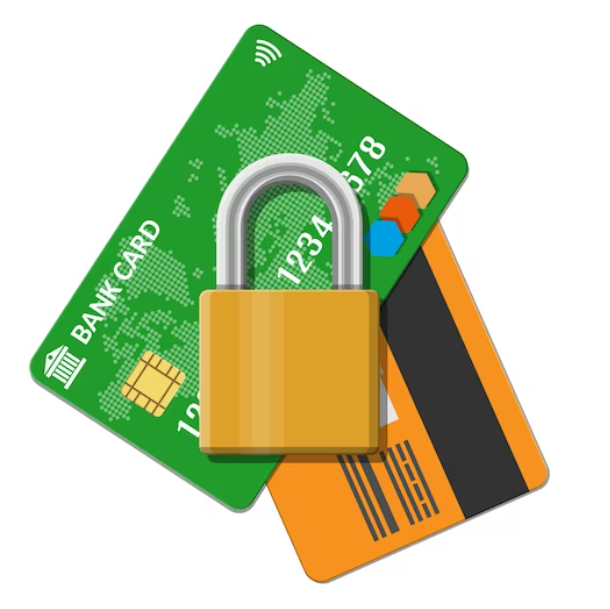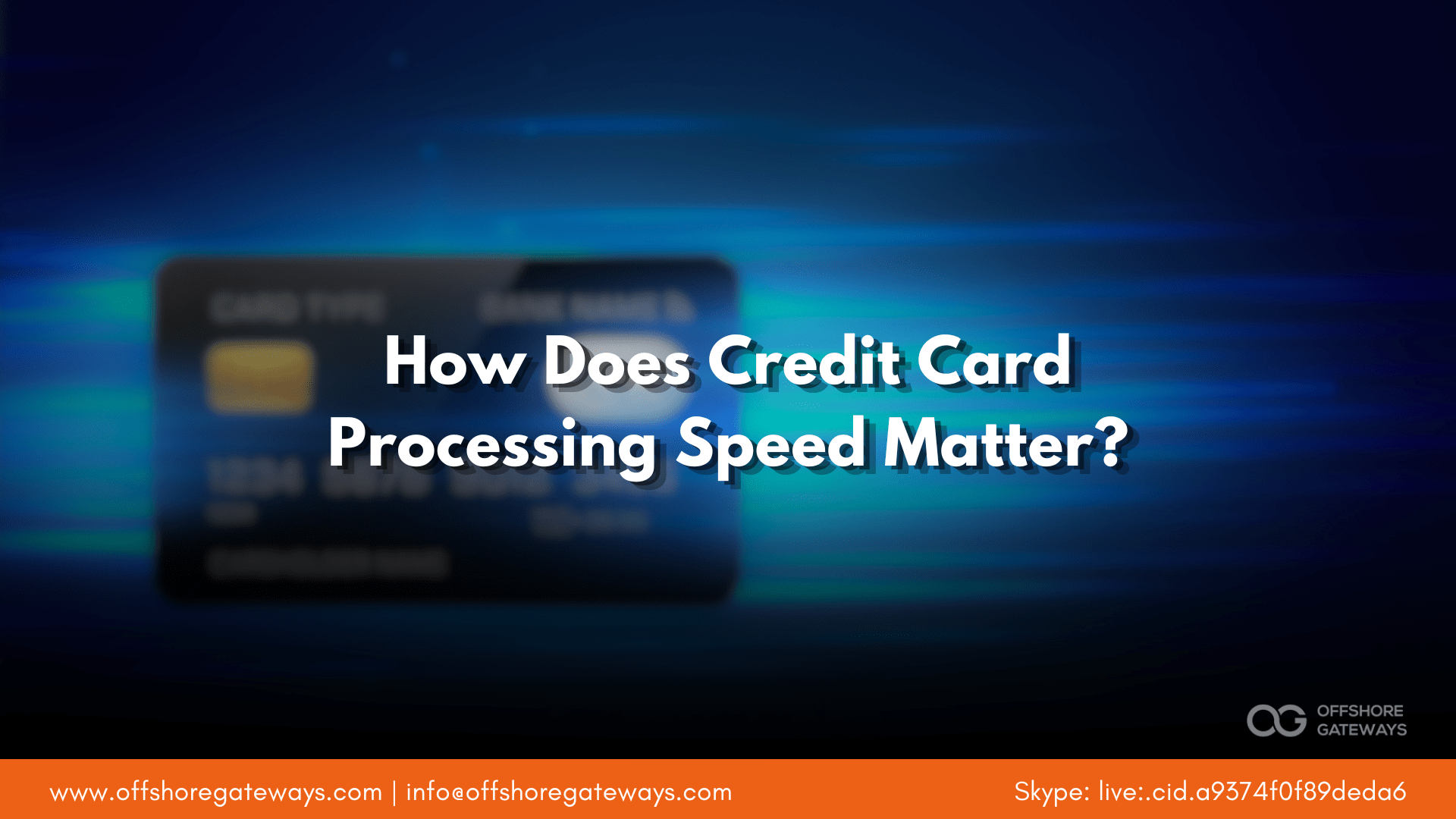Table of Contents
In today’s fast-paced world, where convenience and speed are paramount, credit card processing speed has become a critical factor for businesses and consumers alike. In this comprehensive guide, you’ll learn:
- The key factors influencing credit card processing speed.
- How industry standards and benchmarks define processing speed.
- Tips and strategies to optimize your business’s credit card processing for improved customer satisfaction.
- The impact of processing speed on the customer experience and loyalty.
- The balance between speed and security in credit card transactions.
- Considerations for transaction costs and their relationship to processing speed.
- Real-world examples highlight the importance of efficient credit card processing.
- The role of data security in safeguarding credit card information.
- Why Offshore Gateways is your best choice for a payment gateway partner.
Credit Card Processing Speed: What You Need to Know
Understanding credit card processing speed is crucial for businesses aiming to provide a seamless and efficient payment experience. Let’s explore this topic in depth:
Factors Affecting Credit Card Processing Speed
Numerous factors influence how fast a credit card transaction is processed. Let’s delve into some of the key factors:
- Transaction Type: The type of transaction plays a significant role. In-person transactions tend to be faster than online or mobile transactions due to the immediate card presence.
- Payment Gateway Efficiency: Payment gateways are the intermediaries between businesses and financial institutions. The efficiency and speed of these gateways can vary, affecting transaction speed.
- Network Latency: The speed of data transmission across networks can impact processing times, particularly in online transactions.
- Merchant Account Setup: The way a merchant’s account is set up can influence processing speed. Properly configured accounts are more efficient.
- Fraud Detection and Security Checks: While essential for security, rigorous fraud detection and security checks can add time to the processing of a transaction.
- Card Issuer’s Response Time: The issuing bank’s response time to authorize the transaction is another significant factor. Some banks respond faster than others.
Industry Standards and Benchmarks
To understand whether your credit card processing speed is up to par, it’s essential to be aware of industry standards and benchmarks. For instance, in the retail sector, it’s common for in-person credit card transactions to be processed within a few seconds. Online transactions may take slightly longer, often ranging from a few seconds to a minute.
Comparison of Different Processing Speeds
Credit card processing speed can vary between different payment processors or gateway providers. As a business owner, it’s crucial to compare these speeds when choosing a payment processing solution. A reliable processor can significantly impact the efficiency of your business operations.
Instant vs. Delayed Processing
One term that often pops up in the world of credit card processing is “instant processing.” But is it a reality or just marketing hype? The truth lies somewhere in between. While some transactions can be processed almost instantly, others may have a slight delay due to security checks and authorization procedures.
Instant processing can be a game-changer for businesses seeking to provide a frictionless customer experience. Imagine a busy coffee shop during the morning rush – customers appreciate a quick, hassle-free checkout process.
However, it’s important to note that instant processing may not always be possible, especially for high-value transactions or in cases where additional verification is required.
Speeding Up Credit Card Processing

For businesses, optimizing credit card processing speed can lead to increased customer satisfaction and potentially higher sales. Here are some practical tips to speed up the process:
- Use Efficient Payment Gateways: Choose a payment gateway known for its speed and reliability.
- Streamline the Checkout Process: Simplify your checkout process by reducing the number of steps and input required from customers.
- Reduce Fraud Prevention Delays: Balance security with speed. Implement fraud prevention measures that don’t overly slow down transactions.
- Leverage Technology: Consider using technologies like Near Field Communication (NFC) for in-person payments. NFC enables contactless payments, making transactions faster and more convenient.
Same-Day Processing Options
For businesses with specific needs, same-day credit card processing options are available. These services are particularly useful for companies that rely on quick access to funds. However, they often come with higher fees. It’s essential to evaluate whether the benefits outweigh the costs for your business.
Impact on Customer Experience
Credit card processing speed directly impacts the customer experience. Long processing times can lead to frustration, cart abandonment in e-commerce, or even customer churn in subscription-based businesses. In contrast, swift processing contributes to a seamless and positive experience, enhancing customer satisfaction and loyalty.
Studies have shown that customers are more likely to return to businesses that offer a fast and hassle-free checkout experience. In a competitive market, this can be a significant advantage.

| Processing Speed | Customer Satisfaction | Cart Abandonment Rate | Customer Loyalty |
|---|---|---|---|
| Slow (High Wait Times) | Low | High | Decreases |
| Moderate (Reasonable Wait Times) | Moderate | Moderate | Stable |
| Fast (Minimal Wait Times) | High | Low | Increases |
As you can see in the table above, the relationship between processing speed and customer experience is clear. Faster processing leads to higher customer satisfaction, lower cart abandonment rates, and increased customer loyalty.
Security and Fraud Considerations
While speed is crucial, it should not compromise security. Fraudulent transactions can lead to significant financial losses for businesses. Therefore, it’s essential to strike a balance between processing speed and security.
Modern payment processors employ advanced fraud detection algorithms that can quickly identify suspicious transactions. While these checks add a few seconds to the process, they are crucial for protecting both businesses and consumers.
Cost Considerations
Processing speed can also affect transaction costs. Some payment processors may charge higher fees for expedited processing or instant fund access. Businesses should carefully consider the cost implications and weigh them against the benefits of faster processing.
Real-World Examples
Let’s look at a couple of real-world examples to highlight the importance of credit card processing speed:
Example 1: Online Retailer
An online retailer, specializing in consumer electronics, noticed a high cart abandonment rate during the checkout process. Upon investigation, they discovered that slow credit card processing was a major contributing factor. By switching to a more efficient payment gateway, they reduced processing times, resulting in a 20% decrease in cart abandonment and a 15% increase in sales.
Example 2: Restaurant Chain
A restaurant chain with multiple locations implemented instant credit card processing at its outlets. This move significantly improved customer turnover, as diners could pay their bills quickly and leave without waiting for the check to process. As a result, customer satisfaction scores increased, and table turnover rates improved by 25%.
The Role of Data Security in Credit Card Processing

Another critical aspect of credit card processing is data security. While speed is essential, it should never compromise the safety of sensitive payment information. Let’s explore how data security fits into the picture:
PCI DSS Compliance
The Payment Card Industry Data Security Standard (PCI DSS) is a set of security standards designed to ensure that all companies that accept, process, store, or transmit credit card information maintain a secure environment. Compliance with these standards is crucial for businesses to protect both themselves and their customers from data breaches and fraud.
Encryption and Tokenization
To secure credit card data, businesses often use encryption and tokenization. Encryption involves converting data into a code to prevent unauthorized access. Tokenization, on the other hand, replaces credit card numbers with tokens that have no intrinsic value, making them useless to cybercriminals.
EMV Chip Technology
The introduction of EMV (Europay, Mastercard, and Visa) chip technology has significantly enhanced the security of in-person credit card transactions. EMV chips generate a unique code for each transaction, making it extremely difficult for fraudsters to counterfeit cards.
Why Offshore Gateways Is Your Best Choice for Payment Gateway
When it comes to choosing the right payment gateway partner, Offshore Gateways stands out for several reasons:
- Lightning-Fast Processing: We prioritize speed without compromising security. Our advanced infrastructure ensures that your transactions are processed swiftly and securely.
- Robust Security Measures: We take security seriously. Offshore Gateways employs state-of-the-art fraud detection and prevention measures to safeguard your transactions and protect your business and customers.
- Customizable Solutions: We understand that every business is unique. Our payment gateway solutions are highly customizable, allowing you to tailor them to your specific needs.
- Competitive Pricing: We offer cost-effective solutions with transparent pricing structures. You can enjoy the benefits of faster processing without breaking the bank.
- 24/7 Support: Our dedicated support team is available round the clock to assist you with any queries or issues you may encounter.
Have a Question or Need More Information?
We’d love to hear from you. If you have any questions about credit card processing speed, payment gateways, data security, or how Offshore Gateways can help your business, please don’t hesitate to ask in the comments below. Your feedback and inquiries are valuable to us, and we’re here to provide the answers and support you need.
Frequently Asked Questions (FAQs)
-
What is credit card processing speed?
Credit card processing speed refers to the time it takes for a credit card transaction to be completed, from the moment the card is swiped, inserted, or entered online to the point where the funds are deposited into the merchant’s account.
-
Why is credit card processing speed important for businesses?
Credit card processing speed is crucial for businesses because it directly affects the customer experience. Faster processing can lead to higher customer satisfaction, reduced cart abandonment rates, and increased loyalty. It also impacts a business’s ability to access funds quickly.
-
What factors influence credit card processing speed?
Several factors influence processing speed, including the type of transaction (in-person or online), the efficiency of the payment gateway, network latency, how the merchant’s account is set up, fraud detection and security checks, and the response time of the card issuer.
-
Are there industry standards for credit card processing speed?
While there are no specific industry standards for processing speed, benchmarks exist. In retail, in-person transactions are typically processed within seconds, while online transactions may take slightly longer.
-
How can businesses optimize credit card processing speed?
Businesses can optimize processing speed by using efficient payment gateways, streamlining the checkout process, reducing fraud prevention delays, leveraging technology like NFC for in-person payments, and considering same-day processing options when necessary.
-
Does faster processing mean less security?
Not necessarily. It’s possible to maintain both speed and security in credit card processing. Modern payment processors use advanced fraud detection algorithms to quickly identify suspicious transactions without compromising security.
-
Does processing speed affect transaction costs?
Yes, processing speed can impact transaction costs. Some payment processors may charge higher fees for expedited processing or instant fund access. Businesses should consider the cost implications and weigh them against the benefits of faster processing.
-
Can you provide real-world examples of the impact of processing speed?
Certainly! In one example, an online retailer reduced cart abandonment and increased sales by switching to a more efficient payment gateway. In another, a restaurant chain improved customer turnover and satisfaction by implementing instant credit card processing.
-
How does data security relate to credit card processing speed?
Data security is paramount in credit card processing. While speed is crucial, it should not compromise security. Technologies like encryption, tokenization, and EMV chip technology are used to safeguard credit card data.
-
Why choose Offshore Gateways as a payment gateway partner?
Offshore Gateways prioritizes lightning-fast processing without compromising security. They offer robust security measures, customizable solutions, competitive pricing, and 24/7 support, making them an ideal choice for businesses seeking efficient payment processing.


